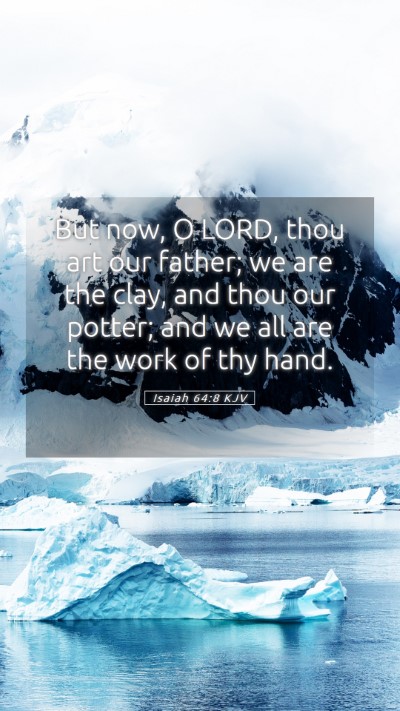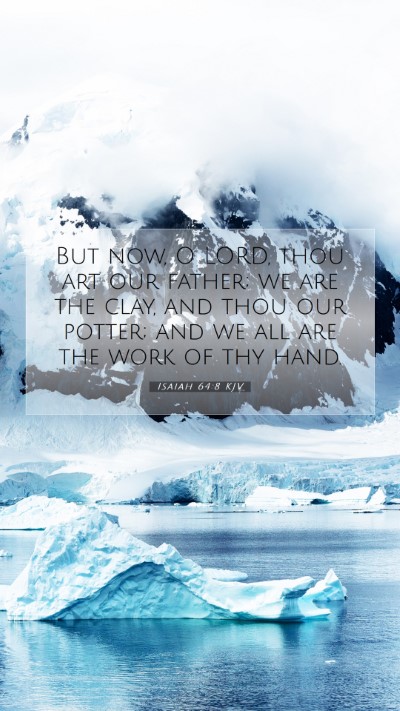Isaiah 64:8 - Bible Verse Meaning and Interpretation
Verse: "But now, O Lord, thou art our father; we are the clay, and thou our potter; and we all are the work of thy hand." (Isaiah 64:8)
Isaiah 64:8 carries profound theological implications regarding the relationship between God and humanity. In this verse, the prophet Isaiah acknowledges God's sovereignty and creative power, likening human beings to clay in the hands of a potter. This metaphor encapsulates several key themes in biblical theology.
Insights from Public Domain Commentaries
Various biblical commentators have provided rich insights into the meaning of this verse, offering interpretations that deepen understanding and encourage reflection.
- Matthew Henry: Henry emphasizes the humility inherent in the metaphor of God as the potter and humanity as clay. He notes that like clay, people are shaped and molded by God, which highlights God's ultimate authority and the dependence of human beings on divine craftsmanship.
- Albert Barnes: Barnes focuses on the relational aspect between God and His people. He interprets the verse as an expression of dependence and trust, illustrating that believers are created by God and should yield themselves to His will, allowing God to form their lives according to His purposes.
- Adam Clarke: Clarke offers a broader context by explaining that this passage reflects the lament of the Israelites during a time of exile. He notes that they recognize their brokenness and need for restoration, turning to God as the ultimate source of reform and renewal.
Theological Themes
This verse encompasses several core theological themes:
- God's Sovereignty: The imagery of a potter signifies God's supreme authority over creation, reinforcing the belief that God has control over the destinies of all people.
- Human Dependence: Just as clay relies on the potter's skill, humans depend on God for guidance, sustenance, and transformation.
- Redemptive Process: The act of molding implies that God is actively involved in the lives of individuals, shaping them for His purposes and restoring them from their broken states.
Application in Daily Life
Understanding Isaiah 64:8 holds practical significance for believers today:
- Yielding to God: The verse encourages individuals to submit to God's plans and trust in His guidance, especially when facing challenges and uncertainties.
- Embracing Transformation: It invites believers to reflect on their own lives as projects still in process, reaffirming faith that God can bring beauty and purpose out of brokenness.
- Fostering Community: As this verse speaks of collective identity, it can be a source of unity within faith communities, reminding believers of their shared reliance on God’s creativity.
Bible Study Insights
For those engaging in Bible study, Isaiah 64:8 can serve as a powerful topic for group discussions. Here are some ideas for Bible study lessons:
- Understanding the Role of the Potter: Explore biblical passages that depict God as a potter and relate them to contemporary experiences of guidance and growth.
- Collective Identity in Christ: Discuss how the imagery of clay and potter can shape understanding of Christian community and shared purpose.
- The Process of Spiritual Formation: Examine the interplay between divine action and human cooperation in spiritual growth and discipleship.
Cross References
Isaiah 64:8 is related to various other biblical passages that expand on its themes:
- Jeremiah 18:1-6: The potter and the clay motif is echoed, illustrating God's authority to shape nations and individuals.
- Romans 9:20-21: Paul discusses God's sovereignty over creation, using the potter-clay analogy to depict God's rights over His creations.
- 2 Corinthians 5:17: The transformative work of God in believers' lives emphasizes the new creation aspect.
Conclusion
Isaiah 64:8 serves as a profound reminder of God's role as the Creator and our position as His creations. Embracing this understanding can lead to deeper faith and a more meaningful relationship with the Divine. As you reflect on this verse, consider how the potter-clay relationship applies to your own life and spiritual journey.
Utilizing this verse in Bible study can enhance your understanding of scripture, making it a crucial component of your Bible study tools and resources. From deep biblical exegesis to practical applications in daily living, Isaiah 64:8 encourages a transformative journey shaped by the hands of the Almighty.


